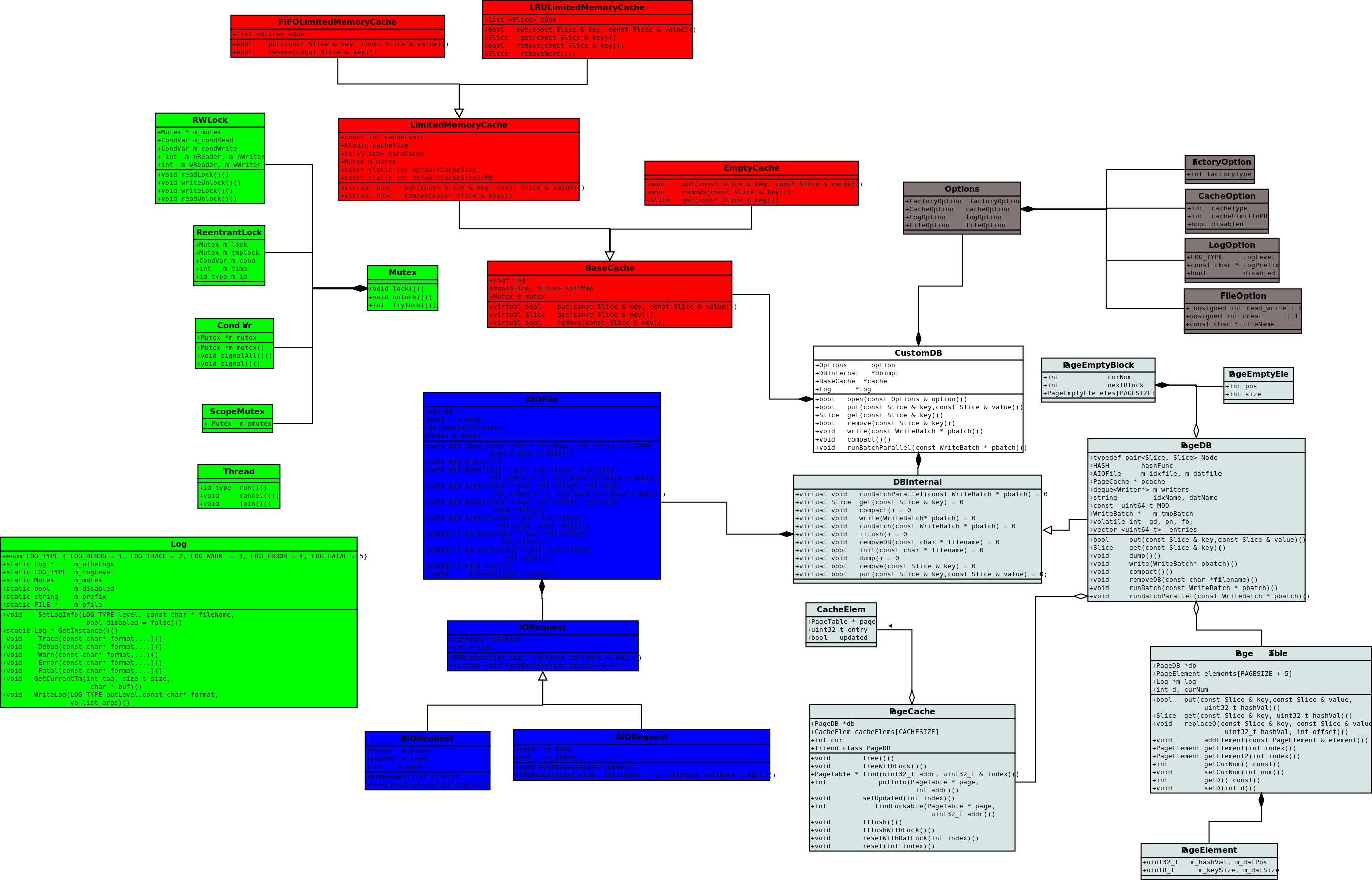PageDB is a key-value storage library and it uses Extendible_hashing as internal structure.
Extendible_hashing use two layers of index tables. The second layer is constituted by pages and each page is constituted by many entries pointed to pairs of key-value.
Also, I have implemented LRU-Cache and FIFO-Cache in its external Cache-System. Anyone, who has interest in it, can add self-customed structure or Cache-Schedule Algorithm to enhance its ability.
Our work is mainly inspired by APUE, GDBM, leveldb and yodb. Thanks again for OSC (Open Source Community).
- Keys and values can be arbitrary byte arrays.
- Byte arrays are represented by
Slice- The basic operations in our library are Put(key,value), Get(key), Remove(key), Put(batch).
- Custom-option Ability, like turn on/off log.
- Exposed
DBImpl(database implementation) interface and Cache interface.- Little RAM required compared with
leveldb.- Little ROM for Page compared with
leveldb
- This is not a SQL database. It doesn't have a relational data model support SQL queries. And it don't support Index in RDB.
- Only a single process can access a particular database at a time. However, multiple-threading in single process can be accepted.
- Only localhost db is supported. If you want to add a server for it, you can read the source code of SSDB.
- No compression tool is provided in the db.
- only random write and random read are supported.
Here is the performance report from the run of db_benchmark.cpp and db_benchmark.h. The results are somewhat noisy, but should be enough to get a ballpark performance estimate.
We try our database with a million entries. Each entry has a 16 byte key, and a 100 byte value. To achieve maximum performance, we turn off log and cache (As the space of the key is far larger than we put, the cache has little performance balance).
PageDB: version 1.1
Date: Tue Jun 17 12:58:54 2014
CPU: 4 * Intel(R) Core(TM) i5-3317U CPU @ 1.70GHz
CPUCache: 3072 KB
Keys: 16 bytes each
Values: 100 bytes each
Entries: 1000000
RawSize: 116 MB (estimated)
FileSize: 143 MB (estimated)
WARNING: Log is disabled, for better performance.
WARNING: Cache is disabled, for better performance.
The "fill" benchmarks create a brand new database, in random order. The "fillsync" benchmark flushes data from the operating system to the disk after every operation; the other write operations leave the data sitting in the operating system buffer cache for a while.
fillsync : 46.0 micros/op; 2.39 MB/s
fillbatch : 7.6 micros/op; 14.43 MB/s
Each "op" above corresponds to a read/write of a single key/value pair. . I.e., a sync write benchmark goes at approximately 20,000 writes per second.
We list the performance of a random lookup. Note that the database created by the benchmark is quite small. Therefore the report characterizes the performance of leveldb when the working set fits in memory. Write performance will be mostly unaffected by whether or not the working set fits in memory
readrandom : 3.0 micros/op; 36.00 MB/s
PageDB provides a method for compression of raw database. However, it only can compress fillsync, which is the most application situation. That can be called time-memory trade-off technology.
Before Compression | After Compression
Raw Size: 230 MB 131 MB
I test our PageDB it on Ubuntu 13.10, so if you have any problem, please feel free to send email to me.
PageDB use GNU Make to handle compilation, you can find detail information from this url.
$ make
$ make tests
$ make db_tests
$ sudo make install
Slice represents the immutable buffer and it is used as the basic representation of key/value. In a nutshell, Slice is the archive of byte arrays.
Slice slice("hello world");
Slice slice("hello world", 11);
...
Option option;
PageDB db = new PageDB;
db -> open(option);
db -> close();
delete db;Stream can either be terminal or file stream
Option option;
PageDB db = new PageDB;
db -> open(option);
db -> dump(std::cout);
db -> close();
delete db;Put is equal to replace. In a nutshell, put will replace the value existed in the db or put a new value into db.
Slice key("slice");
Slice value("123213");
db -> put(key, value);
db -> put("123213","iipppp"); Slice key("slice");
Slice value = db -> get(key);
assert(value.size() != 0); //Not empty. Slice key("slice");
bool successful = db -> remove(key); WriteBatch batch(3);
batch.put(k1, k2);
batch.put(k2, k3);
batch.put(k3, k1);
db -> put(&batch); Option option;
option.cache.type = LRU // Set Cache Type
Cache *cache = new LRUCache(option.cache.slotnum) // For Different Cache
... // Further information can be found in the Option.h #include "TestUtils.h"
using namespace utils;
class A { };
Test(A, Test1) { ASSERT_EQ(*,*)}
Test(A, Test2) {}
RunAllTests(); #include "FileModule.h"
using namespace utils;
FileModule::Size(string filename) // Return the size of file
FileModule::Exist(string filename) // Exist or not
RandomFile file(string filename) // Random File
file.Read(buff, offset, size)
file.Write(buff, offset, size)
- Parallel Map(like concurrentmap)
- Backend Job
